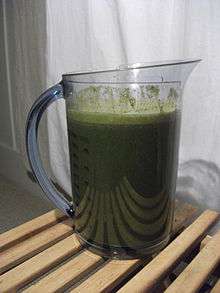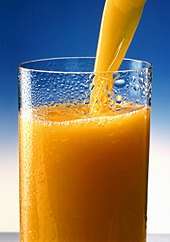Juice fasting

Juice fasting, also known as juice cleansing, is a fad diet in which a person consumes only fruit and vegetable juices while abstaining from solid food consumption. It is used for detoxification, an alternative medicine treatment, and is often part of detox diets. The diet can typically last for two to seven days and involve a number of fruits and vegetables and even spices that are not among the juices typically sold or consumed in the average Western diet.
This diet is sometimes promoted with implausible and unsubstantiated claims about its health benefits.[1]
Criticisms
Catherine Collins, chief dietician of St George's Hospital Medical School in London, England, states that: "The concept of ‘detox’ is a marketing myth rather than a physiological entity. The idea that an avalanche of vitamins, minerals, and laxatives taken over a 2 to 7 day period can have a long-lasting benefit for the body is also a marketing myth."[2]
Detox diets, depending on the type and duration, are potentially dangerous and can cause various health problems including muscle loss and an unhealthy regaining of fat after the detox ends.[3]
Juice mixes containing grapefruit juice may adversely interact with some prescription drugs.[4]
See also
References
- ↑ Valiant, Melissa (27 May 2015). "Do Juice Cleanses Work? 10 Truths About The Fad". Huffington Post.
- ↑ Debunking detox Archived 2014-04-18 at the Wayback Machine.
- ↑ The Truth About Detox Diets
- ↑ "Grapefruit Juice and Some Oral Drugs: a Bitter Combination". Nutrition Bytes (UCLA). 1999. Retrieved 2009-05-04.
